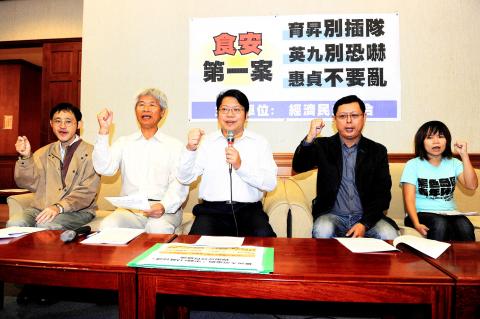Several civic groups yesterday accused the government of exaggerating the potential impact of an impending free-trade agreement (FTA) between China and South Korea after the two countries’ leaders concluded talks on the accord at the APEC summit on Monday.
While the Presidential Office has said the agreement would allow South Korea to further outpace Taiwan in key economic sectors, critics say the government is overstating the impact of the treaty to force the passage of several cross-strait trade agreements and related legislation.
The groups voiced their opposition to a motion by Chinese Nationalist Party (KMT) Legislator Chiang Hui-chen (江惠貞) to place a proposed bill to monitor future cross-strait treaties at the top of today’s legislative agenda, to pave the way for the passage of the cross-strait service trade agreement.

Photo: Chen Chih-chu, Taipei Times
Economic Democracy Union convener Lai Chung-chiang (賴中強) said that legislation to monitor food safety should be prioritized in the wake of the series of tainted oil scandals that rocked the nation.
“The KMT should stop its media campaign to scare the public about the threat engendered by the China-South Korea FTA,” Lai said, adding that the oversight bill should not “cut in line” before food safety concerns.
The agreement between China and South Korea still has to undergo legal and parliamentary review, Lai said, adding that it will likely take at least six months before it takes effect.
Lai rebutted claims by the Ministry of Economic Affairs that the agreement would inflict a serious blow on seven Taiwanese industries — petrochemicals, LCD panels, automobiles, machine tools, steel, textiles and glass — saying that most of these industries cater to the domestic market, with only petrochemicals relying on exports to China.
The free-trade pact aims to achieve an 85 percent reduction in tariffs between China and South Korea over the course of 10 to 20 years, Lai said, challenging the ministry’s economic impact assessments, which he said were based the elimination of tariffs.
The deal would not have a big impact on Taiwanese exports to China, as many of these industrial goods — accounting for about 69 percent of total exports last year — are already tariff-exempt, Lai said.
Taiwan Labor Front secretary-general Son Yu-liam (孫友聯) said the petrochemical industry was the main force pushing for the passage of the under-negotiation cross-strait trade in goods agreement, and accused the government of acting as a “comprador” for “high-polluting” petrochemical firms.
The pending agreement between China and South Korea is a “low-level” FTA whose political significance outweighs its economic benefits, Son added.

The manufacture of the remaining 28 M1A2T Abrams tanks Taiwan purchased from the US has recently been completed, and they are expected to be delivered within the next one to two months, a source said yesterday. The Ministry of National Defense is arranging cargo ships to transport the tanks to Taiwan as soon as possible, said the source, who is familiar with the matter. The estimated arrival time ranges from late this month to early next month, the source said. The 28 Abrams tanks make up the third and final batch of a total of 108 tanks, valued at about NT$40.5 billion

Two Taiwanese prosecutors were questioned by Chinese security personnel at their hotel during a trip to China’s Henan Province this month, the Mainland Affairs Council (MAC) said yesterday. The officers had personal information on the prosecutors, including “when they were assigned to their posts, their work locations and job titles,” MAC Deputy Minister and spokesman Liang Wen-chieh (梁文傑) said. On top of asking about their agencies and positions, the officers also questioned the prosecutors about the Cross-Strait Joint Crime-Fighting and Judicial Mutual Assistance Agreement, a pact that serves as the framework for Taiwan-China cooperation on combating crime and providing judicial assistance, Liang

A group from the Taiwanese Designers in Australia association yesterday represented Taiwan at the Midsumma Pride March in Melbourne. The march, held in the St. Kilda suburb, is the city’s largest LGBTQIA+ parade and the flagship event of the annual Midsumma Festival. It attracted more than 45,000 spectators who supported the 400 groups and 10,000 marchers that participated this year, the association said. Taiwanese Designers said they organized a team to march for Taiwan this year, joining politicians, government agencies, professionals and community organizations in showing support for LGBTQIA+ people and diverse communities. As the first country in Asia to legalize same-sex

MOTIVES QUESTIONED The PLA considers Xi’s policies toward Taiwan to be driven by personal considerations rather than military assessment, the Epoch Times reports Chinese President Xi Jinping’s (習近平) latest purge of the Chinese People’s Liberation Army (PLA) leadership might have been prompted by the military’s opposition to plans of invading Taiwan, the Epoch Times said. The Chinese military opposes waging war against Taiwan by a large consensus, putting it at odds with Xi’s vision, the Falun Gong-affiliated daily said in a report on Thursday, citing anonymous sources with insight into the PLA’s inner workings. The opposition is not the opinion of a few generals, but a widely shared view among the PLA cadre, the Epoch Times cited them as saying. “Chinese forces know full well that